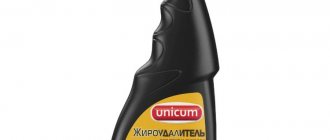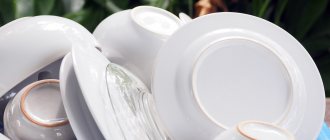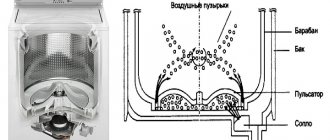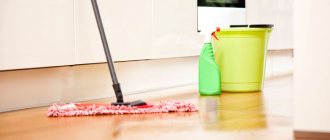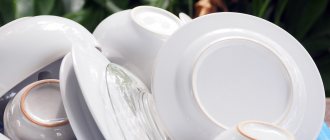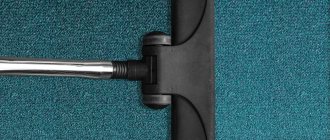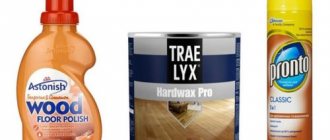How often, after washing in the dishwasher, traces of water drops, streaks and splashes appear on dishes. Is there an explanation for this, and how can the situation be avoided in the future? Today we’ll talk about dishwasher rinses, which not only remove detergent residues and deal with hard water, but also give dishes a pristine shine and extend the life of the dishwasher.
What is dishwasher rinse aid?
Dishwasher rinse aid is a special product that removes detergent residue from the walls of dishes and the dishwasher. Promotes quick drying of dishes without the formation of streaks on the surface, marks from drops and smudges.
The composition of rinses is individual for each manufacturer, but the base consists of identical active substances. The most commonly found components are:
- Surfactants based on ions and cations have a triglyceride-breaking effect and, together with fat molecules, remove stubborn dirt and stains.
- Non-ionic surfactants or defoamers - eliminate excessive foaming, help break down and remove detergent residues from dishes and internal parts of PMM.
- Polycarboxylates are substances that prevent the oxidation of metal parts and the formation of rust.
- Acids (citric acid is more common) - soften water, neutralize the aggressive effects of alkali, which is contained in detergents.
- Tensides - reduce the surface tension of the liquid, thereby preventing the formation of streaks and stains.
- Ethanol (alcohol) - creates a thin film on surfaces and adds shine.
Also contains water and flavorings. The composition does not contain abrasive components that damage dishes or the internal surfaces of household appliances.
In the wake of the fight for the environment, biodegradable products based on organic components have become popular - surfactants based on glucose, fruit acids, balsamic additives (apple and wine vinegar), essential oils, denatured alcohol.
Dish detergents
At wholesale prices from the manufacturer
View catalog
Substances included in the composition
The store-bought product consists of a large number of different substances. The compositions are different and they depend on the cost and functions performed by the rinse aid.
However, almost every rinse aid consists of:
- Surfactants (surfactants) - designed to more quickly remove grease and stains from the surface of dishes;
- Polycarboxylates - help protect dishwasher parts from rust and deposits;
- Weak acids - needed to neutralize alkaline components;
- Ethanol or other alcohol - creates a thin film on the surface of the dishes, which helps to clean them.
Despite the rather complex composition of store-bought mouthwash, some housewives decide to make the product themselves. How to do this will be discussed below.
Why is rinse aid needed?
The operating principle of the dishwasher excludes any mechanical impact, so rather aggressive detergents are used to wash dishes. Under the influence of water pressure, they wash away dirt and food debris. But any aggressive substance leaves traces of mineralization when drying. This can be avoided by using specialized neutralizer components included in dishwasher rinses.
The main functions of the rinse aid, thanks to which the drug gained popularity:
- neutralization of active substances in detergents such as lye and
- eliminating stains and stains from water droplets from the surface of the dishes;
- giving dishes shine;
- reduction of drying time;
- eliminating the smell of food residues from dishes and internal surfaces of the machine;
- protection of internal surfaces, heating elements, drainage system of the dishwasher from scale, greasy or lime deposits, corrosion.
The main function is to complement the functions of the detergent. Together they form an organic duo, cleaning dishes to a shine.
Dosage
Almost all people want to use a minimal amount of detergent, but still clean their dishes effectively. To do this, you need to choose the right dosage, since the amount on the package is clearly overestimated. The dosage may depend on a number of factors: the level of contamination of the dishes, the temperature of the device, the composition of the gel, etc.
To choose the right dosage, you must first take into account the characteristics of the contaminants :
- Presence of fatty residues (burnt or dried). If there are complex stains on the plates, for example, traces of dried buckwheat, then the dose should be 25 mg.
- Temperature 70 C – 20 mg will be enough. facilities.
- Fresh or light stains – 15 mg will be enough.
- Only half of the dishes are loaded into the machine (half of the basket remains empty). Here you need to take into account that the dosage does not depend on the amount of dishes being washed. Even if one mug is loaded, the dosage should be at least 15 mg.
How does the process of washing and rinsing dishes work?
In order to understand the effect of detergents and rinse aids, it is necessary to consider the operating principle of a dishwasher. As always, everything ingenious is simple. It is based on a tank with a retractable tray for dirty dishes, a system for supplying heated water under a certain pressure and a drainage system or draining dirty water.
But, for each cycle, a collection of funds poured into the receiver is provided. For washing, the intake occurs when water is initially poured, which, when heated, circulates, washing away contaminants.
After washing and pre-rinsing, the finishing stage begins, during which the rinse aid is collected. At this stage, residues of detergents are eliminated and shine is acquired.
Additional qualities of rinse aids are determined by the components of the composition.
What to replace
When you don't have store-bought detergent on hand, you can make a simple dishwasher rinse aid with your own hands.
Apple and grape vinegar
A few tablespoons of apple or grape cider vinegar can replace rinse aid and add shine to glasses and plates. For a set of dishes for 6 people you will need 1-2 tbsp. l. vinegar, for 12 people - 2-3 tbsp. l. The liquid should be poured into the rinse aid compartment before starting the PMM. It is better not to use white table vinegar (9%) as it has a specific smell.
Lemon juice
Using freshly squeezed lemon juice, you can prepare dishwashing liquid at home. For this you will need:
- 4-5 tbsp. l. lemon juice;
- 1 tbsp. l. cleaner for home windows, glass, mirrors, cars;
- a few drops of essential oil.
The ingredients should be mixed, shaken thoroughly for 20-30 seconds and poured into the rinse aid compartment. For 6 sets of cutlery you will need 1-2 spoons of homemade mixture, so the prepared product will be enough for 2-3 working cycles.
Selection rules
Which dishwasher rinse aid is best to purchase depends on the purpose pursued by the user and the quality of the tap water used.
- The effect of hard water is neutralized by products containing detergents - components that prevent the formation of deposits on dishes, scale on heaters that heat water, and on the internal parts of the machine.
- If there are small children or people prone to allergies in the family, it is recommended to purchase products made using an ecological formula based on natural ingredients.
- Any manufacturer of household appliances recommends specially developed products that protect key components and internal surfaces and extend their service life. It is also recommended to choose products that are compatible with detergent powder and tablets.
Properly selected chemicals will not only protect equipment from premature breakdowns, but will also preserve the health of all family members.
Conclusions and useful video on the topic
The universal product is not included in the TOP in terms of efficiency and environmental priorities, but it is attractive because it is suitable for rinsing in any type of dishwasher:
A properly selected rinse aid will help wash the greasy plates, dirty cups and other kitchen utensils as cleanly as possible, speed up the drying of dishes and protect the metal parts of the dishwasher from limescale deposits and corrosion.
Such a purchase will not greatly affect the family budget. The product is used sparingly, and even the most expensive bottle will last for at least 150 washing sessions.
Would you like to tell us about the rinse composition you have chosen? Share your reasons for choosing the best product. Please leave comments in the block below, ask questions, post photos on the topic of the article.
Types of rinse aids used
Manufacturers produce products designed to achieve various effects, which are allocated according to their intended purpose:
- direct action - products designed to eliminate mineralization of water droplets and add shine;
- multifunctional - in addition to direct action, they care for the internal surfaces of the dishwasher, increasing the service life of household appliances;
- hypoallergenic - biodegradable, environmentally friendly products, safe for people with hypersensitivity to the components of the composition, as well as for the environment.
The composition of each rinse aid varies depending on the combination with the components of the original detergents, which are recommended for use by manufacturers of household appliances.
Harm to the body
Of course, the presence of chemical components in detergents is harmful to the body. But modern manufacturers are trying to reduce the percentage of very aggressive components. After all, the presence of harmful elements means a high risk of allergic reactions - from hives to edema. Especially detergents with the wrong composition are considered dangerous for children and adults who have increased sensitivity to certain substances, as a result of which it is necessary to rinse dishes as thoroughly as possible and even refuse specific products.
TOP 10 most effective remedies
The presented rating of dishwasher rinses is based on reviews from users, as well as owners of cafes and restaurants. The funds considered belong to different types and price categories.
1st place – Finish
The manufacturer claims that the Finish rinse aid contains defoamers and polycarboxylates for water softening. There is no chlorine or other aggressive additives. Suitable for all PMMs and compatible with most detergents. Users note increased cleaning characteristics, prevention of stains and mineral stains. Also among the advantages are the affordable cost and the consumption of the bottle for a large number of cycles.
Advantages:
- economical consumption;
- price;
- compatibility with most detergents;
- the effect of shine and “creaking” cleanliness.
Flaws:
- Some users didn't like the scent.
2nd place - DeBlank
Liquid rinse aid for dishwashers that effectively removes residual alkaline substances. Prevents the deposition of limescale on machine parts and dishes. Completely eliminates smudges and traces of drops. It has a gentle composition - suitable for silverware, painted porcelain and other tableware. Users have named DeBlank the best dishwasher rinse aid for delicate cleaning.
Advantages:
- multifunctional product;
- contains substances that prevent corrosion;
- compound;
- Suitable for dishes that require delicate washing.
Flaws:
- price.
3rd place - Paclan mouthwash
According to consumer reviews, Paclan dishwasher rinse aid is recognized as the best ratio of price, quality and savings. It is based on an effective formula designed to combat water hardness and the formation of limescale. Particular effectiveness is achieved when using compatible Paclan Brileo products - salt and tablets for PMM.
Advantages:
- ensures dishes are squeaky clean;
- achieved effect;
- price;
- convenient dispenser;
- volume.
Flaws:
- not found.
4th place - Somat (Henkel)
Somat rinse aid is designed for all types of dishes and dishwashers. Effectively copes with products made of glass, earthenware, food grade steel or Teflon coating. Accelerates drying, prevents streaks and limescale deposits on dishwasher parts. The composition, along with effective surfactants, contains preservatives and citric acid.
Advantages:
- effectiveness of the product;
- large volume;
- convenient dispenser;
- price.
Flaws:
- not found.
5th place - Frosch
Eco-friendly Frosch mouthwash with a formula that does not contain ingredients tested on animals. Virtually odorless, does not contain harmful substances. Despite the natural composition, it copes with the task perfectly. Users, along with the composition and large volume, noted the economical consumption - one bottle lasts for 5-9 months, depending on the operating mode of the PMM.
Advantages:
- safe composition;
- efficiency;
- democratic value;
- large bottle volume.
Flaws:
- not detected.
6th place - Bioretto
Bioretto rinse aid contains non-ionic surfactants and citric acid, which do an excellent job of removing detergents, old stains, stains and limescale. Flacoe, 500 ml, is designed to provide 100 rinse cycles. The formula is suitable for people with a sensitive sense of smell, as the composition does not contain fragrances.
Advantages:
- lack of aroma;
- efficiency;
- suitable for children's dishes;
- safe composition;
- price.
Flaws:
- none.
7th place - Synergetic
Biodegradable acid rinse aid for dishwashers based on glycoic, citric and lactic acid, neutral surfactants. Provides safe removal of detergent residues, lime deposits and old grease stains.
Advantages:
- biodegradable composition;
- the effect of shiny clean dishes;
- economical;
- price.
Flaws:
- Some users would prefer this product to be unscented.
8th place - Clean & Fresh
CLEAN&FRESH is a specially developed budget version of the rinse aid. The manufacturer took into account the recommendations of European PMM manufacturers. Thanks to its gentle, specially developed formula, it copes with dirt, detergent residues, and food odors. Gives dishes streak-free cleanliness, freshness and shine, and prevents stains.
Advantages:
- the effect produced;
- volume;
- price.
Flaws:
- the smell of the product.
Sale of household chemicals
At wholesale prices from the manufacturer
View catalog
9th place - Mister Dez
In addition to direct action, Mister Dez rinse aid does an excellent job of disinfecting dishes. Despite the affordable cost, the product is widely used in cafes, restaurants, and catering outlets. It is thanks to its properties that the product is in demand in the fight against the pandemic.
Advantages:
- no odor;
- copes with the task;
- large volume for a reasonable price.
Flaws:
- not found.
10th place - Cinderella
Cinderella is intended for use in all dishwashers. antibacterial, oxygen-containing, bleaching substances. Effective even in hard water, it prevents the formation of scale and corrosion of metal parts of the machine.
Advantages:
- budget cost;
- copes with the task no worse than expensive means.
Flaws:
- not widespread in the retail chain.
Comparison table of characteristics
The table below presents the main characteristics of the funds under consideration. Compare them with each other and choose the most suitable rinse aid option.
| Product name | Production | Features of the product | Package |
| Finish Reckitt Benckiser | Japan | environmental safety, efficiency and perfect results | 680 g |
| Sodasan | Germany | environmental friendliness, safety, accurate and detailed instructions for use | 500-1000 ml |
| Somat | Finland | budget but effective remedy | 750 ml |
| Top House | Germany | combines well with powders and tablets from an identical product line | 1000 ml |
| Paclan Brileo | Germany | protects dishwasherware from damage and breakage | 500 ml |
| Clean Home | Russia | professional household chemical liquid | 1000 ml |
| Frosch | Germany | does not contain hazardous substances | 1000 ml |
Rules for using rinse aid for dishwashers
The rinse aid is used at the final stage of washing; early mixing will ruin the intended effect. Each dishwasher has a special compartment for rinse aid, which releases the product in doses when the water is heated to a high temperature.
Thanks to this, residual detergents are eliminated, the drying process is shortened, and energy costs for the washing process are reduced.
It is necessary to fill the specified volume of product indicated in the instructions. Excessive consumption will not have a negative impact, but will significantly affect the user's budget, since effective quality products are relatively expensive.
The rinse aid is placed in a special compartment. Simultaneous mixing of detergent and rinse aid is prohibited, since the action of the second at the initial stage of washing inhibits the cleaning properties.
Manufacturers of household appliances recommend products specially designed for this type of equipment, which not only clean the dishes, but also extend the life of the PMM. Rinse aids for dishwashers do not pose a threat to health due to the minimal content of preservatives and sulfates in the composition and the absence of contact with skin. Significantly reduces the time it takes to dry dishes, saving effort and energy.
Security requirements
There are some problems and costs associated with using rinse aid in dishwashers. First of all, such products must be stored in a dry and dark place so as not to cause decomposition of the mixture. It is also important to have an airtight container to keep liquids away from children, because unreasonable children constantly strive to try something and, as a rule, receive serious poisoning and burns.
Since many rinses contain strong organic acids, it is not recommended to swallow them and allow them to come into contact with the skin in order to avoid chemical burns, and in the case of anionic products, also severe poisoning due to the separation of the cyano group contained in the substance.
Why is salt needed?
The purpose of salt compositions for PMM is dishwasher.
“>The PMM is that they:
- soften hard water;
- prevent the appearance of scale on device parts and deposits on dishes;
- restore ion exchanger reserves;
- extend the life of equipment.
In addition, special salt destroys pathogenic organisms in the dishwasher, thereby protecting human health.
It is believed that our tap water is too hard for imported equipment, which is designed to meet European standards. Therefore, for efficient and uninterrupted operation of the device, the water must be softened.
Hard is saturated with potassium and magnesium ions, because of this, under the influence of high temperature, scale forms on the working surfaces, preventing the thermal conductivity of the heater surface. To prevent this, the machine passes water through an exchanger, in which magnesium and calcium ions are bound with sodium (chlorine) ions. In this way it is cleansed and softened.
I work in the household appliance repair industry. Extensive experience in restoring washing machines and dishwashers.

